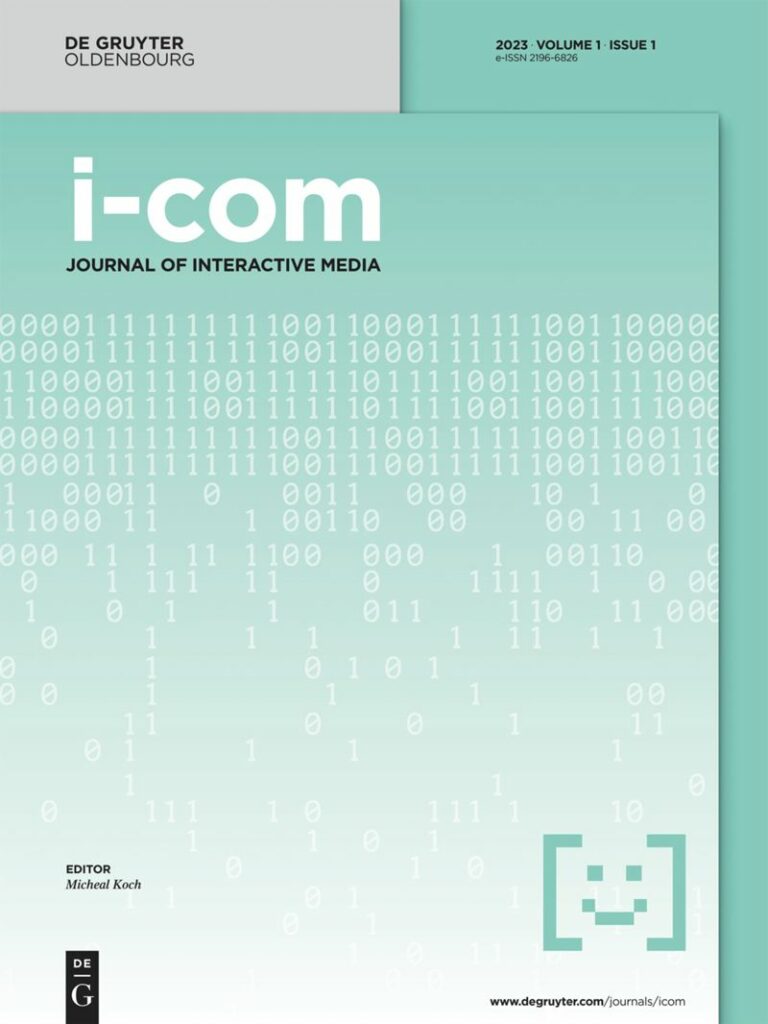In 1984 Irene Greif and Paul Cashman invited to an interdisciplinary workshop on “Computer-Supported Cooperative Work”[1]. Some of the topics presented at this workshop or published soon after were:
- Coordination Technology (Holt)
- The Coordinator (Flores, Winograd)
- First studies on “work practice” (Suchman)
- Workflow management systems (“Domino” – Kreifelts)
- New approaches to office automation (“Gameru” – De Cindio, De Michelis, Simone)
Upon examining these papers and their research objectives, and reflecting on recent years, we can observe that Computer-Supported Cooperative Work (CSCW) has been one of the research fields instrumental in enabling a swift transition to hybrid communication, interaction, and collaboration. The way we work, the way we connect with friends, and the way we engage in society are increasingly intertwined with concepts that have been at the core of CSCW research since “day one”. Recent emerging topics are fostering hybrid cooperation while also integrating its concepts and tools into new collaboration scenarios and broader social life. Given that most applications today are not limited to single-user experiences but involve communication and collaboration among individuals, CSCW is relevant in various emerging themes. This is particularly prominent in the Metaverse, as well as in areas like AI-powered conversational agents.
CSCW has been a topic in several former issues of i-com. So, we did include an introduction to Computer-Supported Cooperative Work in the initial issue in 2001:
Schlichter, J. H., Reichwald, R., Koch, M., & Möslein, K. M. (2001). Rechnergestützte Gruppenarbeit (CSCW). I-Com Zeitschrift Für Interaktive Und Kooperative Medien, 0, 5–11. https://doi.org/10.1524/icom.2001.0.0.05
Issue 4(2) in 2005 was a special issue on “Communities and Community Support”. With Issue 13(2) in 2014 we again had a special issue on “CSCW & Social Computing” – and in the special issue on “20 Years i-com” in 2021 we had a paper reflecting on the initial paper in 2001:
Bullinger-Hoffmann, A., Koch, M., Möslein, K. M., & Richter, A. (2021). Computer-Supported Cooperative Work – Revisited. I-Com Journal of Interactive Media, 20(3), 215–228. https://doi.org/10.1515/icom-2021-0028
For this issue of i-com we had several interesting submissions of which the following have been selected for publication:
“Revisiting Grudin’s Eight Challenges for Developers of Groupware Technologies 30 Years Later” by Melanie Duckert and Pernille Bjørn
The authors review the eight challenges Jonathan Grudin has documented in 1988 (Grudin 1988), and look into how relevant these challenges are today. They do this by revisiting the challenges empirically through ethnographic observations in two companies. The findings for example show that social and organizational challenges persist due to “additional complexities related to factors such as sub-groups’ locations and organizational association, malleable group configurations, and dynamic contexts”.
“What Research Through Art Can Bring to CSCW: Exploring Ambiguous Futures of Work” by Kellie Dunn, Irina Shklovski and Pernille Bjørn
This article aims to explore what the role of CSCW researchers is in creating work futures, and what experiences CSCW researchers want to produce through technology design. To do this, the authors look at artistic practices and find that ‘futuring’ entails engaging with ambiguities of time, purpose, body, identity and agency as foundational.
“Gesture Combinations during Collaborative Decision-Making at Wall Displays” by Dimitra Anastasiou, Adrien Coppens and Valerie Adrien
In this article the authors report about a user study during collaborative decision-making at large wall displays – aiming to analyze combinations of mid-air pointing gestures with other gestures or gaze.
In addition to the CSCW papers we have some other papers in this issue of i-com (which were managed and reviewed outside of the special issue):
“Hybrid Work – A Reconceptualisation and Research Agenda” by Alexander Richter and Shahper Richter
In their paper the authors look at different developments changing the nature of work (increasing proportion of remote work, use of (generative) AI applications and advancements in virtual world technologies and platforms) and argue that these developments ask for a rethinking of the traditional understanding of hybrid work.
The paper matches closely to the topic of this special issue but was acquired via a different submission and review path.
“Cognitive State Detection with Eye Tracking in the Field: An Experience Sampling Study and its Lessons Learned” by Moritz Langner, Peyman Toreini and Alexander Maedche
The authors report about collecting eye-tracking data and cognitive state labels at the same time in a field study, and discuss how this collection of data can be used. As one example of how to use the data they develop supervised machine learning models for the detection of two eye-based cognitive states: cognitive load and flow.
“Best low-cost methods for real-time detection of the eye and gaze tracking” by Amal Khaleel, Thekra Abbas and Abdul-Wahab Sami
In this paper the authors report on new (low-cost) methods for real-time gaze tracking with unmodified web cams.
“Miles apart but close at heart? Exploration of UX checklist for relatedness technologies based on focus groups” by Klara Schuster, Angelina Krupp and Sarah Diefenbach
In this paper in the UX Forum of i-com the authors aim at providing a better theoretical basis for the research and development of relatedness technologies by combining theory from psychology and HCI with empirical insights from four focus groups. As a result, they present a UX factors-checklist consisting of motivators, hygiene factors, and meta topics that can be used when designing and evaluating relatedness technologies to ensure actual use and a positive user experience and highlight next research steps.
[1] See https://dl.eusset.eu/handle/20.500.12015/4097 for a detailed documentation of this workshop.

